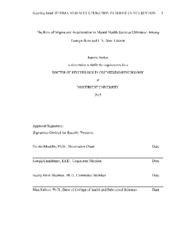The Role of Stigma and Acculturation in Mental Health Services Utilization Among Foreign-Born and U.S.-Born Latinos
Abstract
Foreign-born Latinos are at particular risk for underutilizing mental health services (Alegria et al., 2007b). The purpose of this study was to examine the roles of acculturation and stigma about mental disorder in the use of mental health services among West Coast Latinos, including foreign- and U.S.-born. Variables measured included acculturation, stigma, mental health status, and past-year mental health service visits to three types of providers: (a) medical; (b) specialty mental health; and (c) nonclinical. I accounted for the influence of mental health status as I evaluated the following hypotheses: (1) Foreign-born Latinos will report lower levels of acculturation and higher levels of stigma than U.S.-born Latinos; and (2) lower levels of acculturation and higher levels of stigma will correlate with lower mental health services use. Results indicated that foreign- and U.S.-born Latinos had used services to the same extent in the year prior and reported similar levels of mental health functioning. There was no evidence of a relationship between acculturation, stigma, and mental health services use. However, having insurance and lower education were shown to be predictors of making a mental health visit (p = .014). Unexpectedly, more U.S.-born Latinos had made at least one past-year visit to a non-clinical source than foreign-born Latinos (p = .043). Overall, this study demonstrated that, while cultural and attitudinal factors did not play a significant role in the use of mental health services, socioeconomic factors of having health insurance and lower educational attainment did.
Original item type
PDF
Original extent
127 pages
Collections
Copyright
This original work is protected by copyright. Copyright is retained by the author(s). Works may be viewed, downloaded, or printed, but not reproduced or distributed without author(s) permission.


 Maintained by the Northwest University Library
Maintained by the Northwest University Library